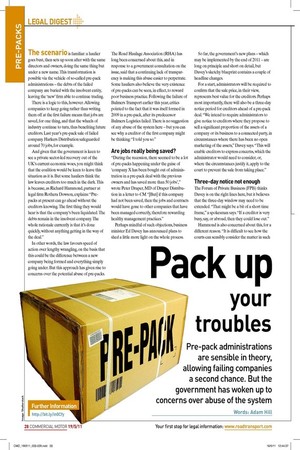Pack up
Page 18

Page 19

If you've noticed an error in this article please click here to report it so we can fix it.
your troubles
Pre-pack administrations are sensible in theory, allowing failing companies a second chance. But the government has woken up to concerns over abuse of the system
Words: Adam Hill
The scenario is familiar: a haulier goes bust, then sets up soon after with the same directors and owners, doing the same thing but under a new name. This transformation is possible via the vehicle of so-called pre-pack administrations – the debts of the failed company are buried with the insolvent entity, leaving the ‘new’ firm able to continue trading.
There is a logic to this, however. Allowing companies to keep going rather than writing them off at the first failure means that jobs are saved, for one thing, and that the wheels of industry continue to turn, thus benefiting future creditors. Last year’s pre-pack sale of failed company Harkers Distribution safeguarded around 70 jobs, for example.
And given that the government is keen to see a private sector-led recovery out of the UK’s current economic woes, you might think that the coalition would be keen to leave this situation as it is. But some hauliers think the law leaves creditors too much in the dark. This is because, as Richard Hammond, partner at legal firm Rothera Dowson, explains: “Prepacks at present can go ahead without the creditors knowing. The first thing they would hear is that the company’s been liquidated. The debts remain in the insolvent company. The whole rationale currently is that it’s done quickly, without anything getting in the way of the deal.” In other words, the law favours speed of action over lengthy wrangling, on the basis that this could be the difference between a new company being formed and everything simply going under. But this approach has given rise to concerns over the potential abuse of pre-packs. The Road Haulage Association (RHA) has long been concerned about this, and in response to a government consultation on the issue, said that a continuing lack of transparency is making this abuse easier to perpetrate. Some hauliers also believe the very existence of pre-packs can be seen, in effect, to reward poor business practice. Following the failure of Bulmers Transport earlier this year, critics pointed to the fact that it was itself formed in 2009 in a pre-pack, after its predecessor Bulmers Logistics failed. There is no suggestion of any abuse of the system here – but you can see why a creditor of the first company might be thinking: “I told you so.”
Are jobs really being saved?
“During the recession, there seemed to be a lot of pre-packs happening under the guise of ‘company X has been bought out of administration in a pre-pack deal with the previous owners and has saved more than 50 jobs’ , ” wrote Peter Draper, MD of Draper Distribution in a letter to CM. “[But] if this company had not been saved, then the jobs and contracts would have gone to other companies that have been managed correctly, therefore rewarding healthy management practices.” Perhaps mindful of such objections, business minister Ed Davey has announced plans to shed a little more light on the whole process. So far, the government’s new plans – which may be implemented by the end of 2011 – are long on principle and short on detail, but Davey’s sketchy blueprint contains a couple of headline changes.
For a start, administrators will be required to confirm that the sale price, in their view, represents best value for the creditors. Perhaps most importantly, there will also be a three-day notice period for creditors ahead of a pre-pack deal. “We intend to require administrators to give notice to creditors where they propose to sell a significant proportion of the assets of a company or its business to a connected party, in circumstances where there has been no open marketing of the assets,” Davey says. “This will enable creditors to express concerns, which the administrator would need to consider, or, where the circumstances justify it, apply to the court to prevent the sale from taking place.”
Three-day notice not enough
The Forum of Private Business (FPB) thinks Davey is on the right lines here, but it believes that the three-day window may need to be extended. “That might be a bit of a short time frame,” a spokesman says. “If a creditor is very busy, say, or abroad, then they could lose out.” Hammond is also concerned about this, for a different reason. “It is difficult to see how the courts can sensibly consider the matter in such a short period,” he points out. “The court is likely to be adjourned. And that could be for a few weeks, which means all that time has to be built in to the process. This delay could be where things start to unravel.” He also questions exactly what redress creditors might have. “I imagine the creditors will be able to file something, but there doesn’t seem to be a lot of detail regarding the format of the notice or what sanctions are available either way,” Hammond goes on.
“What’s been put forward so far is quite vague and principles-based rather than detailed,” the FPB agrees. “We’d be keen to hear more.” But whatever happens, insolvency will remain a tricky area. The balance between giving a failed firm the best chance of carrying on in a new form and ensuring that creditors – often smaller businesses – are looked after will always be a challenge for the scales of justice. “There has to be a line drawn somewhere to allow commercial activity to go on,” concludes Hammond.
Hauliers will be hoping that the new proposals make this line fairer for everyone. ■
The law and the proposed changes
● Pre-pack administrations at present can go ahead without the creditors knowing. But under the new proposals, there will be a three-day notice period for creditors ahead of a pre-pack deal.
● Administrators have to provide a detailed explanation to creditors of why a pre-pack sale was undertaken. In future, this will be included in administration proposals lodged at Companies House – meaning all businesses, including credit reference agencies, can access it.
● Administrators will need to confirm that the sale price of a firm in a pre-pack deal represents best value for the creditors.









































